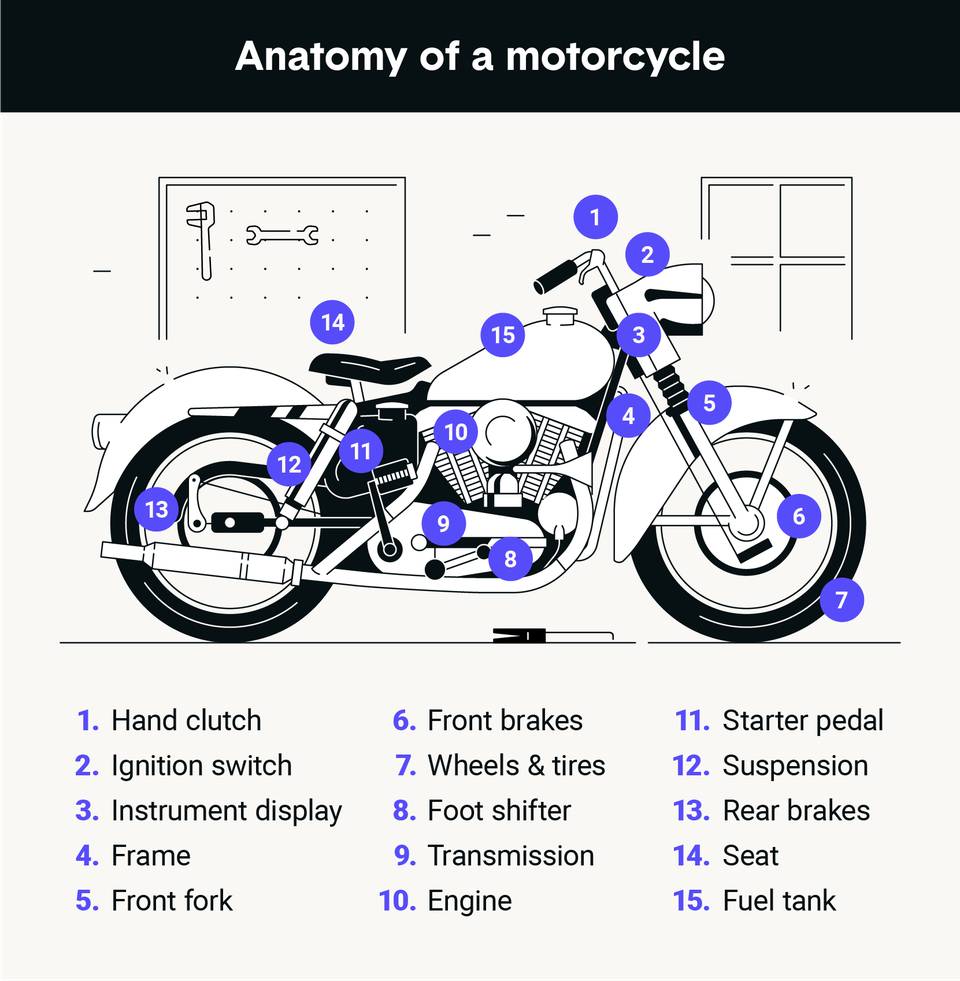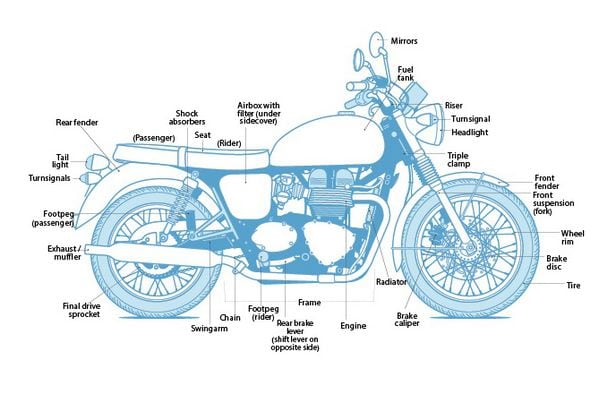Top Performance Tips Using Motorbike Components NZ
Top Performance Tips Using Motorbike Components NZ
Blog Article
Discover the Important Motorcycle Parts You Required for Optimal Performance
Comprehending the important parts of a bike is essential for achieving peak efficiency. Each element, from the engine to the braking system, plays an essential duty in total functionality and security. Normal upkeep can prevent unexpected failings and improve the riding experience. Nevertheless, numerous motorcyclists overlook the intricacies of these systems. Discovering how they collaborate can bring about an extra effective trip. What essential components should every biker prioritize?
The Engine: The Heart of Your Motorcycle
The engine acts as the core element of a motorcycle, driving its performance and defining its capabilities. It is accountable for converting fuel right into power, which powers the bike onward. Different sorts of engines are utilized, consisting of single-cylinder, V-twin, and inline setups, each offering unique features matched for various riding designs and purposes. The engine size, usually determined in cubic centimeters (cc), significantly affects performance, with larger engines normally providing more power and torque.Furthermore, the engine's design and technology, such as gas injection systems or air-cooling versus liquid-cooling, impact performance and dependability. Maintenance is crucial for peak procedure; factors like regular oil changes and checking ignition system assurance durability. Bikers usually take into consideration an engine's responsiveness and level of smoothness, as these characteristics boost the general riding experience. Inevitably, the engine remains a critical element that specifies not just the bike's efficiency yet likewise the cyclist's link to the machine.
The Transmission: Shifting Gears Efficiently
The transmission plays an important role in a motorbike's performance, particularly in the technicians of gear moving. Understanding exactly how to shift equipments smoothly can improve the total riding experience, while normal upkeep guarantees peak capability. Correct attention to these aspects can significantly influence the durability and performance of the motorcycle.

Gear Shifting Mechanics
Smooth gear changing is crucial for optimal motorcycle efficiency, considerably influencing both acceleration and control. The mechanics of equipment changing involve the communication in between the clutch, equipment lever, and transmission system. When a biker involves the clutch, it disengages the engine from the transmission, enabling a gear modification without damaging the parts. A well-timed release of the clutch, combined with precise movement of the gear lever, assists in a smooth change in between gears. This procedure ensures that the engine operates within its finest power band, boosting performance. Bike Parts Wellington. Furthermore, recognizing the gear ratios and their result on rate and torque can aid riders make informed options during shifts, eventually contributing to a more responsive and pleasurable riding experience
Upkeep Tips Significance
Regular maintenance plays a vital role in ensuring that the transmission system operates efficiently, enabling smooth equipment shifts. Routinely transforming the transmission and examining liquid is important, as old liquid can lead to increased friction and wear. In addition, inspecting the clutch for wear warranties peak involvement and disengagement, avoiding slippage throughout gear changes. Lubrication of relocating components is equally crucial to lower rubbing and enhance efficiency. Motorcycle proprietors ought to also keep an eye on for leakages and unusual noises, as these can show underlying problems. By adhering to these upkeep tips, cyclists can extend the life expectancy of their transmission system, guaranteeing that equipment changes remain smooth and adding to the total performance of their motorcycle.
The Braking System: Ensuring Safety on Every Adventure
Braking systems are fundamental elements that straight influence a motorcycle's safety and security and efficiency. They contain numerous components, consisting of brake pads, blades, calipers, and hydraulic lines, all interacting to ensure reliable deceleration. The sort of braking system-- normally either disc or drum-- influences responsiveness and quiting power.Regular maintenance is important to support peak performance; used brake pads can cause reduced efficiency and enhanced stopping ranges. In addition, the top quality of brake fluid ought to be kept an eye on, as it can take in wetness in time, jeopardizing stopping efficiency.Riders ought to also take into consideration the value of anti-lock stopping systems (ABS), which stop wheel lockup throughout sudden quits, boosting total safety and security. Effectively operating brakes are not simply regarding stopping; they instill self-confidence in the cyclist, enabling more secure navigation via numerous terrains. Ultimately, a reputable braking system is vital for taking pleasure in every trip with comfort.
The Suspension: Enhancing Convenience and Control
A well-functioning shock absorber significantly adds to a motorbike's overall performance, matching the effectiveness of the stopping system. The suspension plays a significant duty in taking in shocks from unequal surface areas, guaranteeing a website link smoother ride while keeping tire contact with the road. This get in touch with is vital for both security and control, allowing riders to browse corners with self-confidence and precision.Different kinds of suspension systems, such as telescopic forks or mono-shocks, offer differing degrees of comfort and handling. Correctly tuned suspension boosts responsiveness, offering the motorcyclist with a more connected feel to the motorcycle. Routine upkeep checks are essential to identify the suspension parts, consisting of springs and dampers, are working at their ideal. An efficient suspension system not only elevates the riding experience but likewise adds to the durability of various other motorbike parts by lessening deterioration. As an outcome, buying top quality suspension is vital for any type of serious motorbike enthusiast.
The Tires: Attaching You to the Road
Tires play an essential duty in a motorcycle's performance, acting as the primary web link between the rider and the road. Recognizing the various types of tires available can greatly impact handling and security. Additionally, routine maintenance is vital to assure peak tire efficiency and durability.
Tire Keys In Explained
Just how do various tire types influence a motorbike's efficiency? Tire types play an essential role in establishing a motorcycle's stability, hold, and handling. Sport tires, developed for high performance, offer enhanced traction and responsiveness on smooth roadways, making them optimal for competing and hostile riding. On the other hand, exploring tires focus on longevity and comfort, offering a smoother adventure for long-distance travel. Off-road tires, defined by their tough step patterns, master traction on unpaved surfaces, suitable for adventure fanatics. Additionally, dual-sport tires blend characteristics from both off-road and on-road classifications, satisfying functional riding needs. Inevitably, selecting the ideal tire kind is necessary for maximizing performance, making certain security, and enhancing the overall riding experience.
Maintenance Tips Offered
While riding on the roadway, keeping optimal tire condition is important for safety and security and efficiency. Frequently examining tire stress is essential, as under-inflated tires can result in poor handling and boosted wear. It is suggested to evaluate step deepness regularly; worn tires concession grip and security. In addition, riders must seek signs of damage, such as splits or lumps, which can show the demand for substitute. Revolving tires occasionally ensures even put on, enhancing durability. Moreover, maintaining tires tidy from particles and staying clear of too much aesthetics can lengthen their lifespan. Maintaining correct alignment and balance contributes to peak performance, reducing anxiety on other bike components. Complying with these maintenance tips will considerably boost the overall riding experience.
The Fuel System: Sustaining Performance and Efficiency
The gas system plays an essential role in optimizing a motorcycle's efficiency and performance, as it ensures the optimal shipment of gas to the engine. It makes up several crucial elements, including the fuel storage tank, gas pump, gas filter, and fuel injectors or carburetor. Each part should work efficiently to guarantee a smooth and powerful ride.The fuel storage tank shops fuel and supplies it to the engine via the fuel pump, which generates the required pressure. A fuel filter avoids impurities from getting in the engine, while the injectors or carburetor mix gas with air for combustion.Proper upkeep of the gas system is essential; a clogged filter or malfunctioning injector can bring about reduced efficiency and enhanced additional resources fuel consumption. By confirming that the gas system operates efficiently, bikers can enjoy enhanced throttle feedback, better fuel economy, and generally boosted riding experience.
The Electrical System: Powering Your Adventure
An effective electrical system is vital for the total capability and security of a motorcycle, as it powers important elements such as the ignition, illumination, and numerous electronic systems. This system consists of the battery, which shops power, and the generator, in charge of generating power while the engine runs. The circuitry harness links these parts, guaranteeing dependable power distribution.Additionally, merges secure the system from overloads, while relays help manage high-current gadgets with low-power signals. A well-kept electric system boosts performance by making sure smooth beginnings and consistent operation of signals and lights, important for motorcyclist visibility and safety.Regular checks of the battery's cost and connections are necessary for stopping electric failures. Bikers must additionally evaluate circuitry for deterioration, ensuring all parts function ideally. Ultimately, a robust electrical system contributes substantially to the total efficiency and integrity of the motorcycle.
Regularly Asked Questions
Just how Frequently Should I Replace My Motorbike's Battery?
The regularity of motorbike battery substitute depends upon usage and maintenance (Oem Parts New Zealand). Normally, batteries need to be changed every three to 5 years. Routine checks can assist recognize when a substitute is essential for peak performance
What Devices Do I Required for Fundamental Motorcycle Maintenance?
For fundamental bike maintenance, one calls for necessary tools such as an outlet collection, wrenches, screwdrivers, pliers, tire stress gauge, and a torque wrench. These devices assist in reliable maintenance and guarantee the motorbike runs successfully and securely.
How Can I Improve My Bike's Aerodynamics?
To enhance bike the rules of aerodynamics, one ought to think about changing fairings, see it here using windscreen extensions, enhancing body position, and decreasing total weight. These adjustments aid reduce drag, boosting stability and gas efficiency throughout rides.
What Are the Signs of a Failing Electric System?
Indications of a falling short electrical system include lowering lights, trouble beginning, irregular instrument analyses, and blown integrates. Motorcycle Parts Auckland. Unusual scents or deterioration around battery terminals might additionally indicate underlying concerns needing instant interest for security and performance

Just how Do I Choose the Right Oil for My Bike?
When choosing oil for a motorbike, one need to consider the producer's specs, thickness rankings, and the kind of riding. In addition, conventional versus artificial oil can affect performance and engine defense, affecting the decision significantly. The engine dimension, generally determined in cubic centimeters (cc), considerably affects efficiency, with bigger engines generally giving more power and torque.Furthermore, the engine's style and technology, such as gas shot systems or air-cooling versus liquid-cooling, influence efficiency and integrity. A well-functioning suspension system greatly adds to a motorcycle's total performance, enhancing the performance of the braking system. The gas system plays a crucial duty in making the most of a motorbike's performance and efficiency, as it assures the optimum shipment of fuel to the engine. A gas filter stops contaminants from getting in the engine, while the injectors or carburetor mix gas with air for combustion.Proper maintenance of the fuel system is important; a clogged filter or malfunctioning injector can lead to decreased performance and raised fuel usage. A well-kept electric system improves performance by making sure smooth beginnings and consistent operation of lights and signals, essential for motorcyclist presence and safety.Regular checks of the battery's cost and links are important for avoiding electrical failures.
Report this page